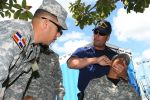Coast Guard Trains Partner Nations in Exercise Tradewinds
Special to American Forces Press Service
NASSAU, Bahamas, March 10, 2009 — Coast Guardsmen from District 7, Tactical Law Enforcement Detachment, are taking part in Tradewinds 2009, a U.S. Southern Command-sponsored exercise designed to increase maritime security.
The Coast Guardsmen trained servicemembers from partner nations in compliant and noncompliant boarding March 6 to 8 at the Royal Bahamas Defence Force Base in Coral Harbour.
The exercise — which includes participants from the United States, Great Britain and 16 Caribbean countries — is focused on maritime interdiction and search-and-rescue operations, with an emphasis on command and control. The exercise began March 4 and runs through March 18.
As part of Tradewinds’ goal to increase maritime security, the compliant and noncompliant boarding training will help to ensure partner nations are able to execute the necessary measures when called upon to board a vessel — with the appropriate use of force — to prevent illegal trafficking.
“The focus of this year’s activities on maritime interdiction is critical and timely, and is in line with our determination that every effort should be made to prevent a significant upsurge in drug trafficking in the Caribbean region,” Bahamas National Security Minister O.A. “Tommy” Turnquest said during the opening ceremonies of the exercise.
Coast Guardsmen instructed their partner nation counterparts in the proper way to approach a vessel occupant in a nonaggressive manner — slowly walking toward the subject with their hands open, palms facing the subject.
“When dealing with compliant occupants of a vessel, it’s like dealing with [peaceful] protestors,” said Coast Guard Chief Petty Officer Matthew Rouse, stationed out of Mayport, Fla.
Even if they don’t immediately follow instructions, “the occupants are noncombatant,” he said.
The students were shown techniques such as pressure points and handcuffing procedures to detain suspects who become aggressive and show resistance, but still are not attacking them.
“Noncompliant [occupants] need a little bit more convincing to cooperate,” Able Seaman Miska Clarke of the Royal Bahamas Defence Force said, “whether it is talking more harsh, getting more physical or using deadly force to achieve the goal of your boarding.”
If the situation escalates and the occupants become violent or aggressive, they then would be classified as noncompliant.
“Noncompliant boarding is a boarding in which the boarding team encounters resistance or resentment from the crew toward the law enforcement presence,” Coast Guard Chief Petty Officer Gustavo Tirado, an Islaverde, Puerto Rico native, said. Partner nation servicemembers were instructed in escalation of force and how to properly evaluate when an occupant is noncompliant and how to keep control of the situation with the correct course of action.
“It’s very important for the partner nations to learn these skills, because they will be conducting these operations in the future,” Rouse said. “There are a lot of people out there up to no good, and we want to ensure that our partner nations’ servicemembers will have the knowledge to deal with those threats.”
Rouse, whose detachment is based out of Miami, said he enjoys the opportunity to train other servicemembers and show them how the Coast Guard operates, as well as to build camaraderie that will benefit all when having to cooperate in real-world events.
“It’s a great chance for us to share with them how we board vessels, and also shows them we’re more than willing to support them,” Rouse said.
Nations participating in Exercise Tradewinds 2009 include the Bahamas, Barbados, Belize, Dominica, Dominican Republic, Guyana, Haiti, Honduras, Jamaica, Nicaragua, St. Kitts-Nevis, St. Lucia, St. Vincent and Grenadines, Suriname, Trinidad-Tobago, the United Kingdom and the United States.
(Marine Corps Sgt. Sheila Brooks and Lance Cpl. Randall Little are with the Exercise Tradewinds 2009 Public Affairs Detachment.)
Source:
U.S. Department of Defense
Office of the Assistant Secretary of Defense (Public Affairs)

 von
von 